Manchester-born Lilian Tree (soprano) was a well-known vocalist in, particularly, Australia, at the end of the nineteenth century.
I bumped into her, 'prima donna [leggiera] of the Carl Rosa', this week and thought, I don't really know anything much about this lady, except that she sang the lead in
New Zealand's early attempt at a light opera. Well, as you who have read my reams of discoveries about Victorian vocalists will know, I can't let pass by one of the species without at least having a go at identifying her or him ... so I started.
I started in the middle, which is a good way of finding beginning and ends. Sometimes.
On 10 October 1888 a Mrs Tree (aged 39) and a Miss L Tree (18) arrived at Adelaide. She had been hired by Martin Simonsen, along with a selection of Italian(ate?) vocalists for an 'Australian' opera company. The press assured that she had 'sung for some nine months with Carl Rosa'. 'Miss Tree's voice, which is remarkable for its fulness and flexibility, embraces three octaves extending to F in alt. Besides this she is pretty, charming, graceful -- and only twenty'. Twenty, eh?
Well name and date were both fictional. The name was easily unveiled, for she had made her first appearances under the name of Lily Crabtree. But she was not to be found in the British birth records as such. Nevertheless, she turned up for me at 16 Shakespeare St, Ardwick, Lancashire in the 1871 census. Father Alexander Crabtree, corn merchant from Oswaldwistle aged 41, wife Ada b Sheffield aged 30, Alexandrina aged 6, Alexander jr aged 3 ... so, the future Miss Tree was not born in 1870, or even 1868, but in 1864. And there she is ... Alexandrina Crockett, born Salford ... Crockett?
However, by the time she was christened, 19 years later, she was known as 'Lily'. And Crabtree. And her father was named as Alexander Crabtree. And he was deceased.
OK. This was not, it seemed, going to be straightforward. It wasn't, but I got there. Ada Amelia Bendelow (b Doncaster), a dressmaker from Sheffield, had been, since 1857, the wife of one Edwin Crockett and the mother of a little Bertha Eliza Crockett (1861).
Alexander Crabtree was also a father and had been, from 1848 until sometime before Lily's birth, a married man. His wife, Hannah née Graves, may even have been the one who died in Manchester in January 1864. His daughter was Harriet Eleanor Ann Crabtree (ka Ellen), born in Liverpool 3 March 1849, who became the wife of schoolmaster Thomas Kilner in 1870. Ada Amelia was her witness.
Then came the history! Alexandrina was born in December 1864. Indubitably to widower Alexander, and the married Mrs Crockett. And, some months later, the parents were wed ...
Ada Amelia was, unsurpringly, slightly unsure of her surname. She was pretty surely no widow.
Alexander wasn't sure either. As witness another marriage ..
Why? How? It all came to court, with Alexander charged with bigamy ..
He was declared ... not guilty! Why?
Small wonder that daughter Lily grew up with a healthy disdain for the state of legal marriage.
Alex continued to cohabit with Ada, Jane sued for divorce. Ada had a son (6 May 1867) and, in 1875 (9 March), a daughter, Catherine Rhoda. And then Alexander died (17 June 1877). Ada took on the running of the Lloyd Hotel in Chorlton-cum-Hardy where she can be seen in 1881 with Lily ('age 16') and Alexander jr ..
And then the music started. In 1883 Miss Lily A Crabtree, aged 18, of Manchester 'a pupil of Charles Halle' won a piano scholarship to the brand new Royal College of Music. She studied singing there, too. She was cast as Countess Almaviva in the college production of The Marriage of Figaro.
In April 1886, she took out the prestigious Parepa Rosa Scholarship at the Royal Academy of Music where she continued her piano studies with Randegger and her vocal ones to such effect that later that year she was engaged by Nelson Vert for the 'London Symphony Concerts' at St James's Hall (Meistersinger quintet). And got herself hired, though still a student, by Carl Rosa.
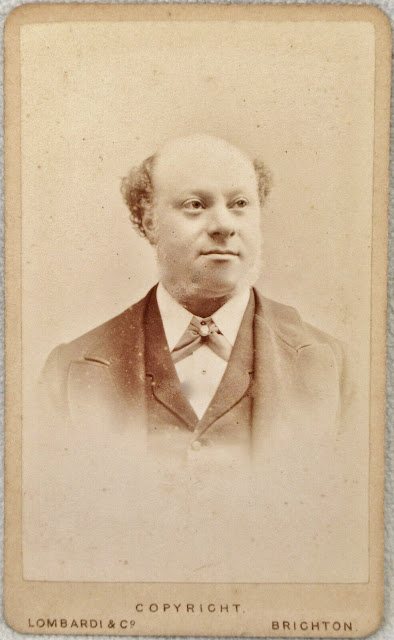 |
| Randegger |
 |
| Joachim |
Lily Crabtree made her debut, as Micaela, to the Carmen of Marie Roze, at the Liverpool Royal Court, where she also sang at the Halle concerts alongside Joachim, being well recieved on both stage and platform. She later affirmed that she also sang in Nordisa, which I do not find.
In 1888 I see her at the Halle Concerts again, taking on no less that a programme than 'Ocean, thou mighty monster', 'Non mi dir' and 'Volte la terra fronte' in another programme with Joachim, and at de Jong's Free Trade Hall concerts, before she returned to the Rosa. Micaela was now sung by her erstwhile understudy, Kate Drew, and Lily was cast as Donna Anna in Don Giovanni, as Countess Almaviva ...
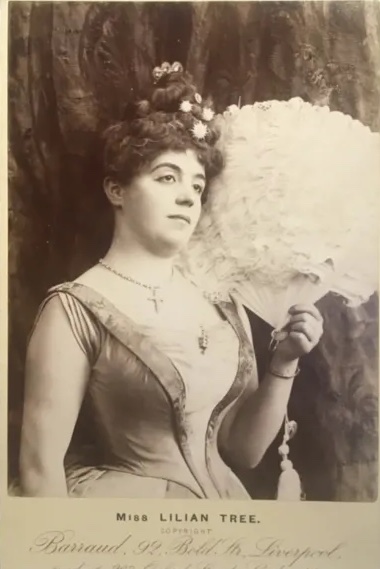 |
| Manchester days |
And then she was gone. Why?, I wonder. With a pretty good English career in view, why did she exile herself to deepest Australia and a company where the manager's wife was the prima donna? I guess we'll never know. Although Lily would go into versions of the subject at length in later years.
Anyhow, she and mama set sail ... and lost a few years of age during the transit of the seas. Lillian (as she was now known) shrunk from 23 to 18. Mamma shrank from 44 to 39. 'Mrs Tree is a lady of means and she and her daughter have come more for the trip than anything else' spake the Australian gossip columns. Ah! Journalism. Mrs Tree was a pubkeeper.
She sang The Rose of Castile, The Bohemian Girl, Il Guarany, Rigoletto, Maritana, Faust, Satanella, Carmen (yes, Micaela again!) before it all fell to pieces, and Lilian rushed to the press with long stories about how she hadn't wanted to come anyway, and was talked into it ... (Sydney Telegraph 30 January 1889). Her engagement was, however, enlivened by the attentions of the Italian baritone Achille Ettore Torquato (ka Attilio) Buzzi (b 1850; d 27 June 1909). Buzzi, who had created the role of Shylock in Pinsuti's operatic Merchant of Venice in 1878 was one of those brought out by Simonsen in 1886. Lilian soon declared she and he would settle in Melbourne .. they were 'engaged'. Lily got 'engaged' quite a lot.
Through 1889 she (and he) appeared in frequent concerts, and contracted with John Solomon for a season at the New Opera House, where they appeared in The Bohemian Girl (with interpolation), Der Bettelstudent (Laura, 'a perfect dream'), Kowalski's Moustique (Queen Venus), Maritana, Martha, La Sonnambula, Faust, The Sultan of Mocha, Nemesis, The Beggar's Opera ...
Mother was still there, So was Buzzi, but Lillian -- who had gathered loving reviews in the highly popoular lighter works of the repertoire -- was flinching. She 'contracted typhoid fever', was 'off' a lot, and would, she announced, return to England in the new year. But come the new year, she was still in Australia, playing the repertoire with what had now become Henry Bracy's company. That company finally closed in mid-1890, and Lillian returned to the concert platform. I see her in October 1890 singing in The Seasons. Baritone: Signor Buzzi.
Finally, she did head for Europe. Where mother had seemingly gone before. Back to hotel management at Gregg's Hotel in Darwen. Buzzi didn't. 'After a short rest [she] journeyed to Milan where she stayed eleven months, [studying with Blasco] appeared on the stage there, and in February [1892] made an appearance with the Carl Rosa at Liverpool' in the title part in Aida. Georgina Burns had been forced out of the role through illness, Marie Roze had taken her place... but on 19 February Lilian 'who has kindly undertaken the part at a few hours notice' stepped in. 'Her first appearance this season'.
She gave a second performance at a matinee 25 February while Mme Roze sang Trovatore in the evening and seemingly a third before the Rosa Liverpool season ended. And so did Lilian's Rosa career.
In May 1892 she sailed back into Sydney, from Naples, on the Oruba. With a husband. An Australian husband. Or 'husband'. The not-long widowed Dr Arthur John Vause was the wealthy owner of the private mental asylum at Bay View, Tempe, and the couple, it seems, had met shipboard. The marriage or 'marriage' lasted some two years. Her absence from the platform was of no length at all (Stabat Mater Her Majesty's Sydney 31 March 1893) but that from the stage, in spite of perpetual rumours, was to be longer.
In 1894 she was touted to visit America 'engaged for the Metropolitan Opera House'. But she didn't. Then, or any of the other times similar rumours were propagated. What she really did was scarper from Australia with a major (married) local personality, Dr Harman Tarrant.
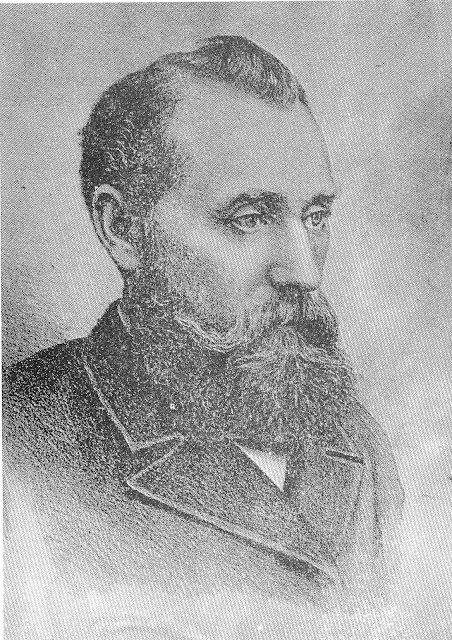 |
| Tarrant |
According to her, she travelled with him through Europe, where she sang Aida at 'the Grand Opera, Milan', then at Genoa, Naples, and Cracow, over a period of two years. I can't quite fit 'two years' in here, and I have yet to exhume those soi-disant European performances from any source. Anyhow the couple ended up in England.
 |
| Hedmondt |

Lilian appeared in the Halle concerts ('her first appearance since her successful Australian tour'), and then got involved in E C Hedmont's ambitious season of opera at Covent Garden, where she was cast as Brünnhilde in The Valkyrie and Santuzza in Cavalleria Rusticana. Her reception was diverse: one paper described her as 'stout' another as 'pretty and petite'. Her acting, some opined, left something to be desired. Her physique was clearly not in her favour. And though the voice seemed to have been excellently maintained, and was generally described in favourable terms, one journo described her Santuzza as 'not up to the average of an English provincial one'. It's just a suspicion, but I think her 'manager', Dr Tarrant may have been getting up some people's noses. But other writers make Lilian the villain in the tale of a relationship which was pretty well ended before Tarrant's death, in poverty and alcohol, 10 September 1900. The international press was favourable: 'une belle voix, une jolie femme, et une artiste consciencieuse'.
One other important person, however, liked her performance. Augustus Harris hired her for his opera company at Drury Lane, and her Santuzza, there, was perfectly well received, although one paper worried that it was hard to imagine the tragic Santuzza 'when uttered by such a bright, cheerful and handsome prima donna'. She sang Venus in Tannhäuser ('sang with grace and refinement, looking the part of Venus to the very letter') and repeated her Brünnhilde ('deserved success') where, once again it was noted 'Miss Tree cannot be blamed because Nature has not endowed her with an Amazonian figure' but her 'excellent singing and dramatic feeling', it was judged, made up for lack of Teutonic butchness. When Harris produced Hansel and Gretel, Lilian sang the mother, Gertrude. A range of parts which would seemingly have fitted her usefully into any major opera company.
But at the end of the season, it was back to the concert platform -- the Queen's Hall Promenade Concerts (where she sang the 'Liebestod', Beethoven's Egmont, Robert le diable), the Glasgow Sundays, Samson in Edinburgh, more Halle concerts, a concert party tour ('Mme Lilian Tree and party') .. and finally, in March 1897, she turned up back in London topping the bill at London's Palace Music Hall. She sang 'I dreamt I dwelt in marble halls' and 'The Children's Garden'. And then she headed back to the Antipodes.
Back 'home' she continued her music-hall experience at the Sydney Palace and the Tivoli with Harry Rickards ('The Song that Reached my Heart', 'The Last Rose of Summer', 'Robert, toi que j'aime') and subsequently toured with Rickards' Biograph Company. She also continued her habit of giving lengthy newspaper interviews which didn't always tally with verity .. 'I shall be 25 at Christmas'. No, Alexandrina, you will be 33.
She was still, though considerably plumper, a star, and paragraphs regarding the offers she had refused for the Metropolitan Opera, NYC, Covent Garden et al hit the press regularly. As did such earth-shaking news as her sprained ankle, her intention to enter a convent, and the continuing propinquity of Mr Tarrant.
 |
| Philip Newbury |
When tenor Philip Newbury was added to the Rickards company, the Trovatore Miserere was added to the programme, on which Lillian was now featuring such as 'Softly Sighs' and 'Ernani involami' alongside 'Come Back to Erin' and 'Home, Sweet Home'. Such was her success, that she continued with Rickards through 1898. Then she returned to the stage for John Solomon. The opera was Carmen, and now Lily was no longer Micaela, but 'a very substantial' Carmen, supported by Jack Leumane and Ted Farley and a rather second-rate cast. It was agreed that she sang it well, but the bill was soon varied with Maritana and The Bohemian Girl.
At the end of the season, 'Madame' Tree advertised for pupils. And Tarrant, who had failed in his efforts to re-establish himself in the eyes of authority, in spite of heavy advertising, died. Back in Italy, Buzzi was said to have joined a Carthusian brotherhood.
Lily, who had not been spared in her paramour's obituaries, advertised for vaudeville engagements, and soon returned to Rickards. It was not a success. She was no longer the public's darling.
She was sued for debt ... interestingly, as 'Miss Lilian Tree' spinster .. and shortly after quit Australia for, this time, New Zealand, where, in 1903, she was reported to have married one Charles Lund 'well known in connection with the Lund line of steamships'. The records show that Charles John Gilbert Lund of Wellington married Lilian Margaretta Lancaster ... another husband, another name .. ? But she would be Mrs Lund for the next two decades. She remained in Auckland, teaching singing from 15 Grafton Road, and giving concert opera with the locals, until Alfred Hill and J Youlin Birch brought out their opera A Moorish Maid (26 June 1905). Lilian was starred in the leading role of La Zara at the head of a cast made up largely of amateurs for six nights at Auckland's His Majesty's. When the show went further, Lilian did not go with it. She had a 'serious illness'.
 |
| Youlin Birch |
In 1906 Mr and Mrs Lund voyaged to England. All sorts of rumours as to grandiose offers filtered back to the Australasian press, including one that she had been offered the role of Lady Jane in Patience. I see her only, in 1910, at a short-lived Brighton Festival singing Lola in Cavalleria Rusticana and the Verdi Requiem (4 February) alongside Watkin Mills ...
Lilian was now chopping 15 years off her age. And Charles was a .. hatter? What happened to the shipping line?
Come the war, he joined the airforce, and revealed his birthdate. 28 May 1886. That can't be right. Married at 17? Elsewhere its 1881. Married at 22. Oh! Alexandrina! Now we see why you are shrinking your age so drastically!
Charles Lund died at Epsom, Surrey 1 September 1926 'aged 45'. He left L146.12.3d to his wife Lilian Margarita Lund of Furnival Mansions, 25 Wells Street, Marylebone.
I imagine that Lily was the Lilian Lund who died in Paddington in 1933. Admitting to 52 years of age. She was 68.
So, that tidies up the bits and ends of Miss Alexandrina Crockett ka 'Lilian Tree'. There are a few left to sort out, but this is a pretty fair start. And I'm thinking what might have happened had she stayed in Manchester, with Halle, the Carl Rosa et al. A lady who could sing the Liebestod one minute, and 'Robert toi que j'aime' the next. But I suppose she did extremely well as a big fish on the other side of the pool. And had a good few 'adventures'.












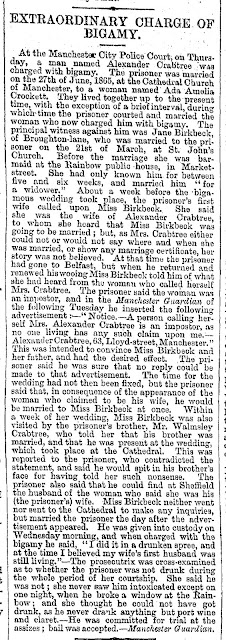




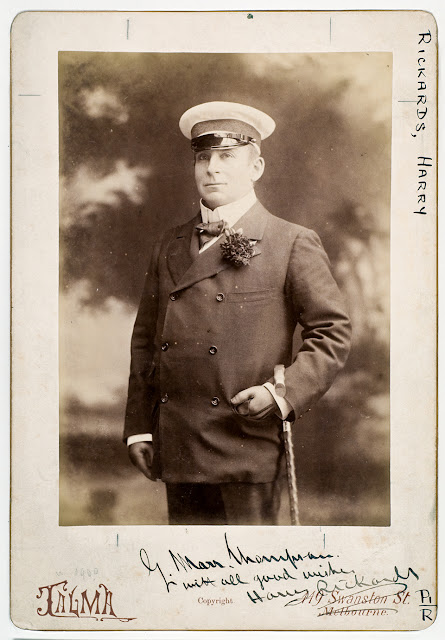


No comments:
Post a Comment